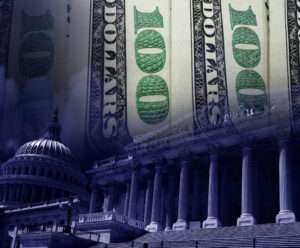The Volokh Conspiracy
Mostly law professors | Sometimes contrarian | Often libertarian | Always independent
Congressional Budget Office Estimates Recent Increase in Immigration will Reduce the Budget Deficit
A new CBO report concludes it will save the federal government almost $1 trillion over the next ten years.

A standard defense of immigration restrictions advanced by many libertarians and conservatives is the idea that they are necessary to restrict welfare spending. If we let in too many immigrants, spending will increase and the government will either have to massively raise taxes or face a dangerous fiscal crisis. But a new report by the bipartisan Congressional Budget Office adds to the already extensive evidence that immigration actually improves the government's fiscal position. Specifically, the CBO finds that the surge in migration since 2021 will create a net savings of $970 billion for the the federal government between 2024 and 2034. CBO reaches this conclusion partly because most immigrants pay more in taxes than they take out in government benefits, and partly because immigration increases economic growth, which in turn increases tax revenue.
This is far from the first study reaching this sort of conclusion. I discuss some of the others in Chapter 6 of my book Free to Move. My Cato Institute colleague Alex Nowrasteh published a more recent and extensive overview last year. Unlike the CBO study, his analysis considers effects on state and local budgets, as well as the federal one.
Even if the fiscal effects of immigration really were negative, they could be addressed by the "keyhole solution" of further limiting immigrants' access to government benefits, rather than the far crueler and more harmful measure of excluding them entirely. I cover this approach in some detail in my book, and consider various ways it could work.
Improving the federal government's awful balance sheet is far from the only beneficial economic effect of immigration. It also promotes growth, entrepreneurship, and innovation, especially since immigrants make disproportionate contributions on the latter two fronts.
Obviously, fiscal arguments are far from the only possible rationale for constraining immigration. Restrictionists can still argue that we should keep people out because of possible negative effects on culture, crime, and the like. If these other types of harms are large enough, they could potentially outweigh beneficial economic effects. But fiscal issues do play a major role in debates over immigration policy, and they are probably the most common argument advanced by restrictionists who also consider themselves to be free market advocates.


Show Comments (99)